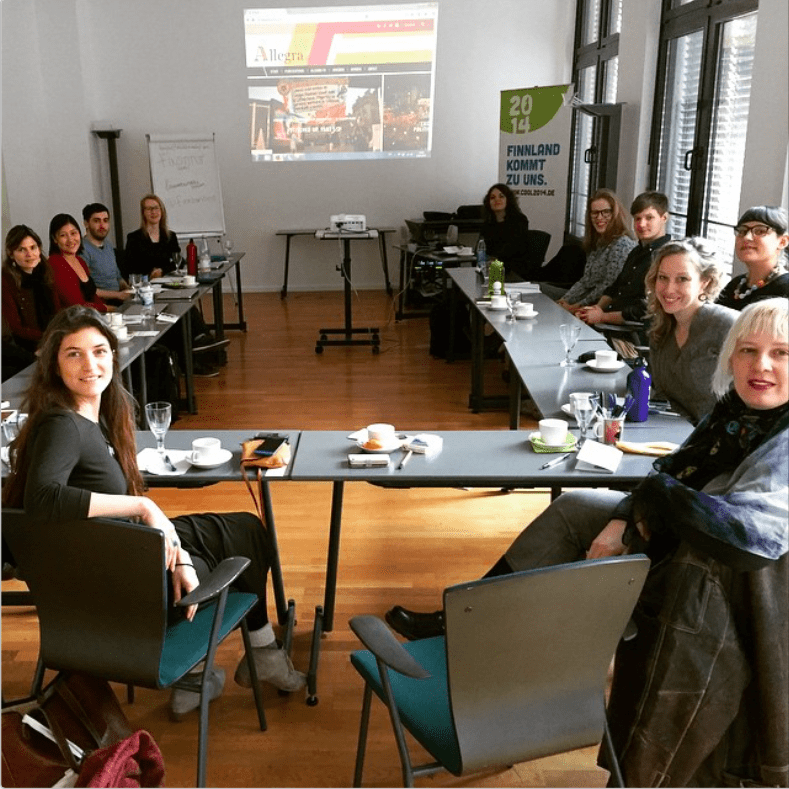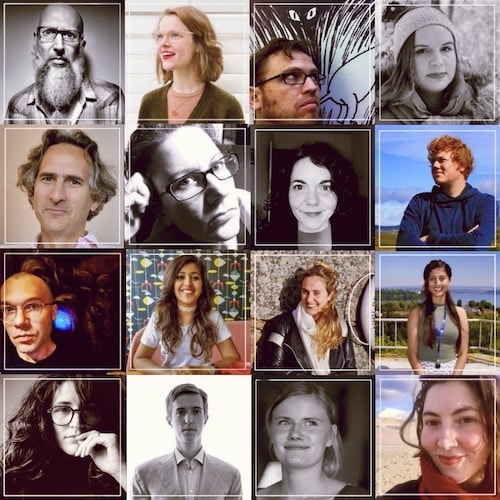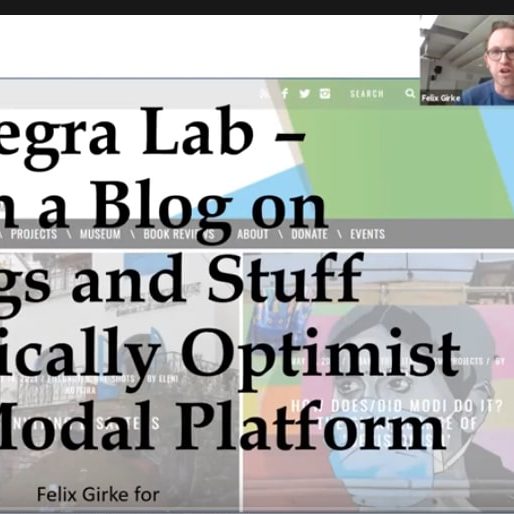What is an academic blog? Who form its audience and who are, or should be, its authors? How does blogging resonate with more ‘serious’ – or at minimum slower – publication modes? What about blogging and rigid academic hierarchies – discussed recently for example by Antonio De Lauri at Allegra; how can blogs challenge them without losing the respect of the global academic community? How does one ‘grade’ blog writings in institutional evaluation reports that have no equivalent categories?
 These are some of the questions that were addressed on February 19 as a group of ‘Allie’s Allies’ met up at the Finnish Institute of Berlin to celebrate the re-
These are some of the questions that were addressed on February 19 as a group of ‘Allie’s Allies’ met up at the Finnish Institute of Berlin to celebrate the re-
launch of allegralaboratory.net. The event brought together core members of Allegra’s editorial team along with a lively collection of creative professional scholars involved with the academic blogosphere within the Berlin area and beyond.
The mood of the event was light with plenty of laughs, and its informal three-hour program simply flew by. Yet it was accompanied by dark sentiments of the current stage of the academia – an issue that we have repeatedly addressed also at Allegra.
Let’s begin with the positive. Our discussion confirmed the primary sentiment that provides a continued motivation for us to develop Allegra – namely that the novel horizons of the online realm do embody previously unforeseen opportunities to introduce fresh voices to academic debates. They also offer ways to question and even redefine the frameworks and hierarchies in which academic knowledge is commonly produced.
Thus, online spaces hold significant promises as experimental ‘labs’ – the label embraced by Allegra – to challenge and diversify conventional expressive modes and thus contribute to the continued vibrancy of our collective profession. The journey of an unfinished thought from a ‘tweet, to Facebook post, to blog post, to article and book’, as well as the fresh possibilities for inter-play of thought and reality, offer wonderful and largely unexplored avenues for genuine collaboration and creative expressions both within the academia and beyond.
So why are we not witnessing all this? Why isn’t the scholarly blogosphere filled with exciting experiments, each more bizarre and fantastic than the next?
Sadly, we did not struggle to identify reasons. One of them is the tenor of self-promotion, which characterizes many personal blogs – also those encouraged, even expected of scholars on the home sites of their universities. We strongly agreed over the dubious academic relevance of such one-sided communication, which often exists divorced from collegial feedback or sound editorial processes.
Another problem is posed, quite plainly, by restrictive mind-sets: although the space is virtual, as scholars maneuver in it they continually drag with them conventional mind-sets from the world of ‘paper’, dictated by far more limited choices for publication format and pace. We see this echoed in many open access journals, which continually build on the concrete printing schedule of the paper journal, and publish for example book reviews at the pace of specific journals issues even though nothing dictates this for online spaces.
Importantly, limitations induced by word count and printing schedules do not exist in the virtual realm which, by contrast, are open to fluctuating and spontaneous operations and offer unlimited publication space. When these possibilities are overlooked, these online journals end up suffering from the same backlogs and delays that plague paper journals, although this new media would allow for a greatly superior volume.
As a consequence many existing online journals inadvertently contribute to the hopelessly slow pace of academic discussions, effectively diminishing any relevance that they might have to wider ongoing societal debates. How do you contribute to a current exchange of world crises if your book on the topic will only appear in 3-5 years after the fact, and a review on it in another 2-3 years? As we know, both are sadly realistic time estimates. In her paper, Judith Beyer outlined additional problems via her discussion of the problems of how ‘digital humanities’ are currently conceptualized, and how old expectations for scholarly productivity collide with novel forms (we are pleased to share her paper soon).
All of the above is increasingly frustrating when placed against the backdrop of the current crisis of journalism. Talking of this crisis is hardly news, yet a compelling reminder of its intensity was offered last week as an editor from the British newspaper the Telegraph, publicized the reasons for his resignation: in the newspaper the marketing department had ended up intervening with editorial work to such an extent that it resulted in ‘a fraud’ toward the readers and the basic task of journalism to provide an independent critical voice in the face of power.
Having followed global news flows intensely because of Allegra’s social media, we know tangibly what this crisis means: journalism has increasingly been transformed into ‘social media watching’. In other words, content is today increasingly produced in a centralised manner by a few large multinational news agencies, which then spreads globally as journalists dispersed around the world pick up this content for their own news feeds – with light editing. Thus we are increasingly seeing the same pieces of information circulating from one newspaper to the next.
This development is deeply worrying. Realistically, we have no reasons to be any more trusting of these multinational news agencies and assume that the autonomy of their editorial policies would be significantly greater than what we are hearing in the case of the Telegraph. Thus the need for genuinely independent voices intensifies.
With all this considered we see an almost unprecedented call for new sources of information and analysis – a call that scholars are uniquely suited at addressing.
When we combine this call with the immediacy that an online space offers, with strong moderation and a global collegial network that can mobilize professional scholars to comment on virtually any subject or region, we are starting to see something truly unique: virtually unprecedented possibilities for scholars to have an impact on ongoing societal debates via online platforms.
To fulfill this task with diligence is one of our primary goals with Allegra. Over the past year we have began to see what this amounts to in practice via our numerous thematic weeks, including those on refugees curated by Luigi Achilli or transitional justice curated by Julie Billaud.
Yet, no matter how determined we are and how wonderful a team we already have with us at Allegra, we cannot do this task alone.
To realize the prospects outlined above, we need significant support. In plain language: to allow for novel online scholarly initiatives to realize their potential, proper funding strategies are needed. Here we cannot trust ‘the commercial market’, at least not alone, for reasons that need little elaboration. In our discussion in Berlin we did hear of some very promising funding schemes – importantly also from the German academia, which many of us know as ‘slightly conservative’. This is warmly commendable, and we hope that many more similar initiatives will follow.
However, in order for these funding schemes to genuinely assist scholars to full fill the goals stated above, they need to be set up very carefully: in order for online platforms to form true alternative voices, these platforms need to remain autonomous. As soon as traditional institutions attempt to ‘tame’ them with funding that has ‘strings attached’, and insist on placing these online experiments under their own ‘brands’ – aka under university websites – these online spaces are incorporated as parts of the standardized university ‘machine’ of knowledge production.
Simultaneously, their zing is compromised and the promises of something new are watered down. Further, these online spaces will become corrupted by the very same problems that today plague the academia in general, among them expectations for quantified and ‘accountable’ productivity – all problems that we have discussed also at Allegra. Thus, if forced to conform with conventional structures, instead of being able to realize the promise of something new these online spaces will merely end up contributing to the very same tendencies that are at the heart of the current global university crisis.
With our re-launch, we are more dedicated than ever to take on the tasks outlined above. The fabulous new design of our site is the result of months of hard work by graphic designers Michel et Michel and their wonderful web developer. The site not only looks good, but also entails significant technical features that allow us to genuinely experiment with different working methods.
There are no longer limits to the formats that we can publish including sound files and videos, and thus we are also technically equipped to start embracing the novel creative prospects that the online world offers!
Jointly all this amounts to unabashed popularisation of scholarship – but not the banal, boring kind that so often is connected with this label. We insist that in attempting to tread along this path, most people have simply gotten things all wrong. It is not the popularization – aka simplification – of content that we need, but rather the popularization – aka improvement – of FORMS that is required.
In other words, we trust, and have also received enough signals to support us in this assessment, that ‘out there’ is a vast audience eager to read and hear us scholars – but only if the formats via which we present our message are both technically and aesthetically pleasing enough.
We strongly feel that what we present to you via this new design of allegralaboratory.net encompasses the kind of vision and boldness that has previously not been seen in the scholarly blogosphere!
With this new site, Allegra can now proudly consider itself a true lab. We therefore encourage you to submit your artifacts for AVMOFA (Allegra’s Virtual Museum of Obscure Fieldwork Artefacts), your fieldwork playlists and soundtracks for our Jukebox, or your ethnographic films for Allegra TV! You can also share some fieldnotes, an essay, a book review or an interview with your favourite anthropologist. As added incentive, with this new site all our contributors together with their portfolios are featured in our authors’ gallery. The gallery already includes more than 130 contributors – and this is after only the 18 months that Allegra has been in existence.
Of course all this is just a beginning – for our shared ambition is nothing short of introducing genuinely novel alternatives for scholarly interaction also beyond the virtual world. Whether this will mean the tangible realisation of the utopian Université de Muri, or something else remains to be seen. Yet here the journey is certainly as important as its end destination. We will keep you posted.
THANK YOU, our devoted ‘Allies’ aka our readers and authors, for sharing this fantastic ‘intellectual magic carpet ride’ with us! Warm thanks to everyone on the Allegra team for hard work in getting this new website re-launched, as well as for your dedication to continue exploring exciting unknown horizons!
We conclude this post with a PLEA FOR SUPPORT:
We hope that during Allegra’s existence we have managed to persuade our Allies of the determination that we bring to this project, which to us is an embodiment of our passion to disseminate scholarly content in the world – and thus also make it a better place.
To date our site has over 180 000 page views, which has convinced us into believing that we have also managed to reach an audience. This numerical achievement becomes that much more impressive when we recall the technical limitations that the previous version of our beloved site had (aka its hopeless slowness, inevitable crashing on tablets…all reasons why we initiated this re-design in the first place).
So far Allegra has received no outside funding. Rather, it is run by a dedicated team of volunteers, who devote their time and energy to this joint mission. Its costs, including the costs of this website re-design, have been covered by Allegra’s creators.
If you wish to support us in this work – which we are determined will also guide us toward more sustainable funding arrangements – please consider making a donation and becoming a Member of Allegra Lab Association.
This post was first published on 23 February 2015.






